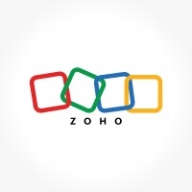


Find out what your peers are saying about Microsoft, Salesforce, Qlik and others in Reporting.
In a world surrounded by data, tools that allow navigation of large data volumes ensure decisions are data-driven.
Power BI is easy to deploy within an hour, providing robust security against data leaks.
This saves a significant amount of time, particularly for reports that would have needed around fifty people.
The ROI of using Tableau extends to its seamless integration across various platforms, as it's from Salesforce and thus not limited to any specific cloud provider.
Tableau is saving me time, money, and resources, which I would rate as ten.
The integration with Zoho People is particularly important because I can access real-time data at any time, including what's happening in the last minute.
After incorporating Zoho Analytics, now all our decisions come from its reviews.
Any time I've integrated customer data using Zoho, I've received great feedback and referrals, and Zoho has gotten me referrals and more customers.
The significant drawback I notice is that Microsoft's size makes it hard to get specific change requests addressed unless they involve a bug.
We have a partnership with Microsoft, involving multiple weekly calls with dedicated personnel to ensure our satisfaction.
The support is good because there is also a community available.
They provide quick email and phone responses and have Thai-speaking personnel.
There should be consistent standards for all users.
The technical support for Tableau is quite good.
The support team doesn't have full awareness of the system capabilities.
Zoho support provides assistance through live chat to guide us.
If you need help with any issue you face, you can directly call them.
You expect only a small percentage of users concurrently, but beyond a thousand concurrent users, it becomes difficult to manage.
With increasing AI capabilities, architectural developments within Microsoft, and tools like Fabric, I expect Power BI to scale accordingly.
As more data is processed, performance issues may arise.
Tableau is easy to use across various dimensions, whether on-premises or on the cloud.
The solution is fully scalable and performs well even with large datasets, provided there is proper supporting hardware.
Tableau is easy to scale.
Zoho Analytics can easily adapt to our needs when they grow, and you don't need much knowledge to adapt it; even basic Excel knowledge is sufficient.
You can utilize URL features to redirect users to their records in Zoho CRM or Zoho Desk with just a click.
Zoho Analytics is scalable.
In terms of stability, there's no data loss or leakage, and precautions are well-managed by Microsoft.
We typically do not have problems with end-user tools like Excel and Power BI.
It is very stable for small data, but with big data, there are performance challenges.
The application hangs after continuous use due to the buildup of cache.
I rate the stability a five or six because Tableau updates very often with new versions or patches.
A major missing feature compared to Power BI is the ability to create multiple DAX measures or row-level context, which would be useful for showing custom profit and loss statements.
The stability and reliability of Zoho Analytics have been good over time.
The stability and reliability of the product is crucial for optimal performance.
This makes Power BI difficult to manage as loading times can reach one or two minutes, which is problematic today.
Access was more logical in how it distinguished between data and its formatting.
Microsoft updates Power BI monthly based on user community feedback.
We cannot send the entire Excel file reports via email within Tableau.
The product owner should enhance its benefits or clarify its role.
It sometimes requires extensive investigation to determine why the data does not appear correctly.
The collaborative features of Zoho Analytics have faced one issue: they have tried to reduce the sync time with most Zoho applications, but even with CRM, the sync still takes one hour.
While Power BI uses Power Query, an intuitive and powerful tool that allows data manipulation in any way, Zoho Analytics has limitations.
Having to pay for 25 users when only 11 are needed creates an issue with the pricing structure.
I found the setup cost to be expensive
Power BI isn't very cheap, however, it is economical compared to other solutions available.
The pricing for Microsoft Power BI is low, which is a good selling point.
Power BI as a much cheaper alternative.
A license for 150 users costs around $17,000 USD per year.
Looker is known to be quite expensive.
The annual subscription cost of Zoho Analytics is equivalent to about half of the monthly cost of tools such as Tableau or Power BI.
The pricing for Zoho Analytics is actually cheaper than the competitors for the kind of service they provide.
In today's data-driven environment, these tools are of substantial value, particularly for large enterprises with numerous processes that require extensive data analysis.
Within the organization, Microsoft Power BI is used to create dashboards and gain insights into data, enhancing data-driven decision-making.
To reduce the need for highly skilled personnel, we can engage someone who is just familiar and has a basic understanding of Microsoft Power BI, while AI can handle the major tasks through either agent AI or requirement analysis.
A significant feature for me is the real-time connection to data sources because it effectively manages large data sets.
Tableau serves as a stable dashboarding tool for higher management, aiding in quick decision-making.
Building hyper extracts and visualization capabilities make Tableau a robust tool for data analysis.
The AI called Zia in Zoho Analytics is extremely useful. Whenever I build a chart or dashboard, I can generate a summary of insights using this AI tool, which is very convenient for both leadership and manager level teams to understand the data concepts.
The best feature is that in the same tool, we can use SQL and business intelligence capabilities.
Regarding integration capabilities, I have found Zoho Analytics' 100+ integrations very effective in consolidating data from various sources.
| Product | Market Share (%) |
|---|---|
| Microsoft Power BI | 23.8% |
| Tableau Enterprise | 20.2% |
| Zoho Analytics | 1.1% |
| Other | 54.9% |



| Company Size | Count |
|---|---|
| Small Business | 134 |
| Midsize Enterprise | 57 |
| Large Enterprise | 165 |
| Company Size | Count |
|---|---|
| Small Business | 117 |
| Midsize Enterprise | 66 |
| Large Enterprise | 183 |
| Company Size | Count |
|---|---|
| Small Business | 29 |
| Midsize Enterprise | 4 |
| Large Enterprise | 4 |
Microsoft Power BI is a powerful tool for data analysis and visualization. This tool stands out for its ability to merge and analyze data from various sources. Widely adopted across different industries and departments, Power BI is instrumental in creating visually appealing dashboards and generating insightful business intelligence reports. Its intuitive interface, robust visualization capabilities, and seamless integration with other Microsoft applications empower users to easily create interactive reports and gain valuable insights.
Tableau Enterprise offers powerful features for creating interactive visualizations, dashboards, and maps, including drag-and-drop functionality and easy integration with multiple data sources, promoting real-time collaboration and self-service analysis.
Tableau Enterprise stands out with its ability to create user-friendly, interactive visualizations, making it pivotal for business intelligence applications. Users benefit from its seamless connectivity and advanced analytical functions, facilitating data blending and storytelling. Despite a complex learning curve and high licensing costs, its features like geospatial analysis and efficient content distribution drive its indispensable value for data-driven insights. Enhancements in predictive analytics and support integration with machine learning tools further its capabilities across industries.
What are the most valuable features?Tableau Enterprise is widely used for business intelligence, supporting industries like healthcare, telecommunications, and finance. Organizations utilize it to analyze performance indicators, operational insights, and financial analytics, enhancing decision-making through interactive reports and real-time data integration.
Zoho Reports is a powerful, easy-to-use and highly scalable cloud-based reporting and business intelligence platform for small to medium-sized businesses. Its flexible pay-as-you-go pricing model and scope for customization allow businesses to tailor it to their unique needs.